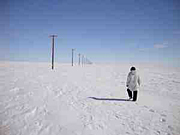- Number 316 |
- July 19, 2010
Turning up the heat in Alaska

A DOE study will test the impact
of increased temperature on
Arctic tundra.
Scientists at DOE's Oak Ridge National Laboratory are planning a large-scale, long-term ecosystem experiment to test the effects of global warming on the icy layers of arctic permafrost.
While ORNL researchers have conducted extensive studies on the impact of climate change in temperate regions like East Tennessee, less is known about the impact global warming could have on arctic regions.
"We're beginning to take these lessons learned and start applying them to sensitive and globally important ecosystems, such as the arctic," said Stan Wullschleger of the Environmental Sciences Division and the ORNL Climate Change Science Institute. "The arctic regions are important to the topic of global warming because of the large land area they occupy around the world and the layer of permanently frozen soil, known as permafrost."
Wullschleger and a team of architects, engineers and biologists from ORNL and Brookhaven and Los Alamos national laboratories design, simulate using computers and then field test large-scale manipulative experiments that purposely warm a test area in order to evaluate ecosystem response to projected climate conditions.
[Katie Freeman, 865.574.6110,
freemanke@ornl.gov]
